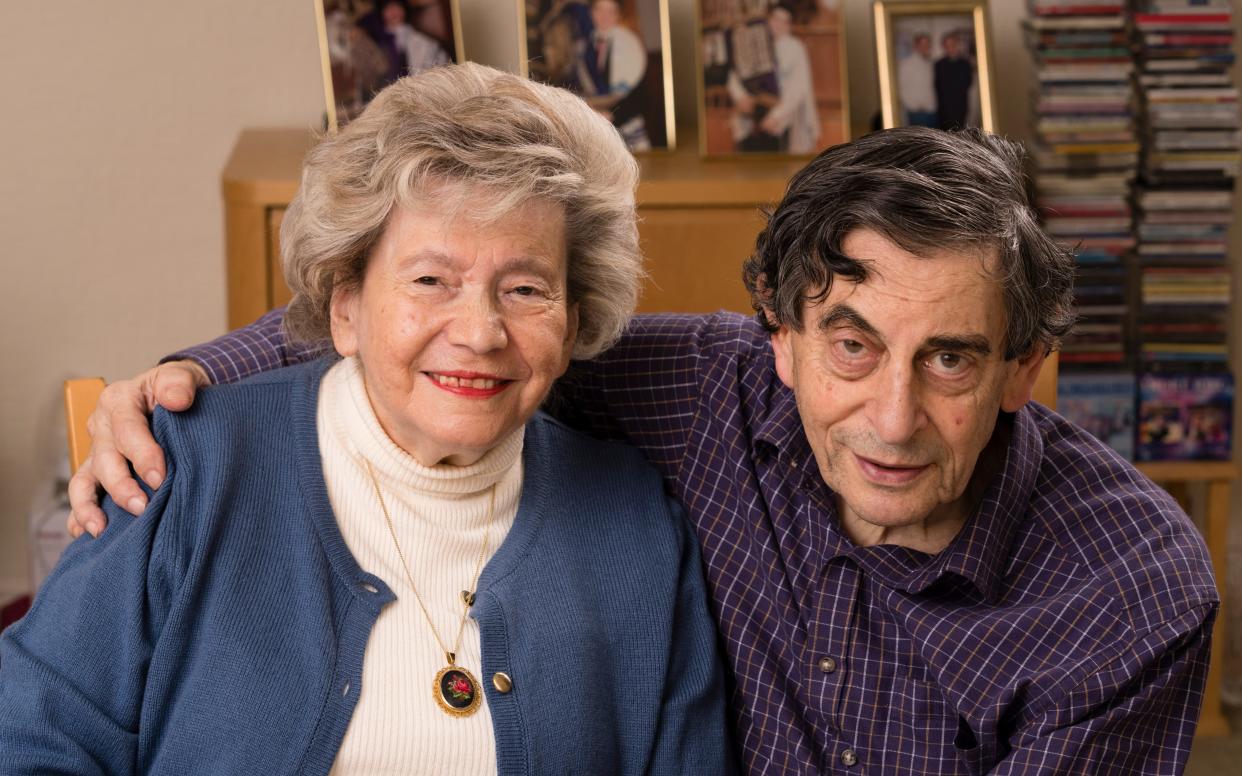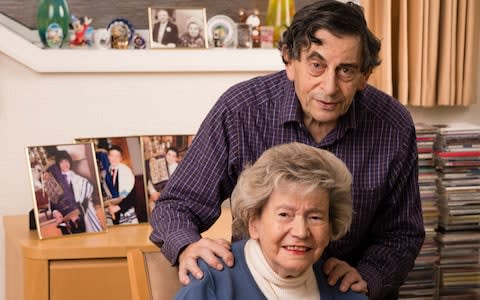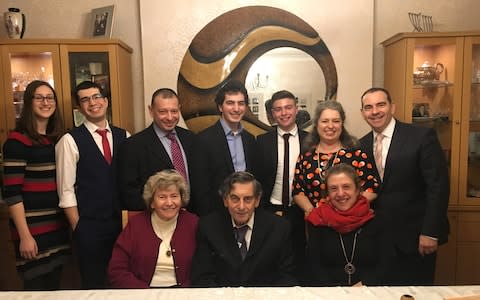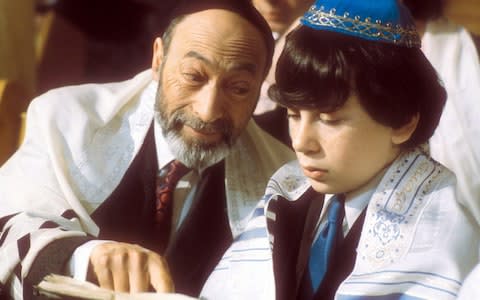Meet the new bar mitzvah boys and girls - celebrating coming of age at 80

“You know what tomorrow is, don’t you?” asks young Eliot Green in the 1976 television play Bar Mitzvah Boy. “Only the day that marks my passage, isn’t it?”
“Are you scared?” inquiries his school friend cheerfully. “I was scared rigid at mine. I made 16 mistakes in the Hebrew bit.”
Eliot is 13, the usual age at which, according to Jewish law, a boy takes on all the rights and obligations of an adult - a “passage” marked by his participation in, or leading of, a synagogue service. The bar mitzvah ceremony requires many months of preparation and for the young teenager in question can indeed be nerve-racking.
Less so for a new group of bar mitzvah boys and bat mitzvah girls: those undertaking the traditional coming of age ceremony far later in life - in some cases at almost 100 years old.
An increasing number of Jews are having a second bar or bat mitzvah to celebrate having made it to their dotage. As a result, the words “bar mitzvah boy” can now denote a man of 63, 73, 83 or even older, repeating the rite of passage to mark the 50th, 60th or 70th anniversary of his original one. For the older women doing bat mitzvahs, it is often their first time, since the female version of the ceremony has a relatively short history.

Rabbi Jonathan Romain confirms he now sees about three older people a year doing bar or bat mitzvahs at Maidenhead Synagogue. “It’s a growing trend that reflects a desire for both affirmative rituals and personal markers,” he says. “[It’s people thinking] ‘I don’t want to get to 63 or 83 and just have another birthday cake. I want to make it personal. It’s an example of a long-standing tradition being extended by popular demand and given new resonance.”
It also reflects the fact that people are living longer, he notes - “and [that they] are much more mentally alert, for example at 83 still being capable of study and often relearning Hebrew after years of neglect.”
So while a normal bar or bat mitzvah will typically feature a row of proud grandparents in the congregation doing what is known in Yiddish as kvelling (which roughly translates as bursting with pride), the old boy and old girl versions are instead attended by proud grandchildren, such as those of David and Charlotte Lang.
Watched by their two sons and three grandsons (one of whom had flown in from Israel for the occasion), the couple from North London, aged 83 and 82 respectively, last month undertook a joint bar and bat mitzvah at Barnet Synagogue. David had done his first elsewhere in London 70 years earlier. For Charlotte, a Holocaust survivor who fled to Britain from Vienna with her family when she was four, it was her first time - though perhaps not her last.

In the back room of the house they’ve shared in Golders Green since their marriage 55 years ago, their congratulatory cards are still displayed, the Hebrew words “mazel tov” printed on the front. David proudly points out the certificates they received to mark the occasion on December 23, framed and hung on the wall.
What made them do it then, at their age?
“I don’t know!” admits Charlotte, a retired secretary. “We were talking to [our son] Paul one day and he just said ‘why don’t you?’”
About | Bar and Bat Mitzvah
“And we decided to have a joint bar and bat mitzvah, which is a bit unusual,” adds David, who served with the RAF in his youth before working as a management accountant for the Civil Aviation Authority and Royal Aeronautical Society. “Not only my son but friends as well as family members said, ‘you’ve got to 83, you should have a second bar mitzvah.’ So I said ‘ok, why not?’ It’s an occasion for a simcha, a party, and it’s good to look for occasions for simchas so we had this and it all went very well. Even the weather was nice.”
There is a certain logic to the trend. As Rabbi Miriam Berger of Finchley Reform Synagogue in North London points out: “In the Talmud [the writings that cover Jewish law and tradition] we’re told 70 years is a lifespan.” So at 83, the age of many of the bar mitzvah old boys, a person has effectively done a lifespan plus 13 years.
And why stop there? Some of those who live long enough are even having a third bar mitzvah at the age of 96. In 2012, the late Morris Hoffman, a former Bletchley Park code-breaker, was among them. Like the Langs, Hoffman did his at Barnet Synagogue. He died two years later, aged 98.

Of course, besides the age difference, there are further ways in which the bar or bat mitzvah of an older adult varies from those of the usual cohort of 12 and 13-year-olds dragged through theirs each year. Whereas children undertaking the ceremony tend to mark the occasion with a party afterwards, the old boys and girls are less likely to opt for a celebratory disco, or to have Beyoncé performing at their bash, as businessman Philip Green’s son Brandon did in 2005. The Langs went for something more sedate, certainly, with a lunch for 22 hosted at their son and daughter-in-law’s house. In lieu of the lavish gifts often given to the teenagers, the pair asked for charitable donations.
There is also typically more willingness on the part of adults who have chosen to do it for themselves, compared to children who have been coerced into doing it by their parents and grandparents.
“A lot of 13-year-olds aren’t necessarily sure if they want a bar mitzvah,” says Rabbi Romain. “But their parents put them on the factory line and it’s the done thing. It’s like doing GCSEs, and it’s just one of those things, whereas at 63 or 83 it’s a voluntary thing.”

It doesn’t always go according to plan, however. One 83-year-old man preparing for a bar mitzvah at Maidenhead Synagogue died just two weeks before the ceremony.
“We went ahead without him and turned it into a celebration of his life,” says Rabbi Romain, who has also noticed that an increasing number of mothers whose daughters are doing their bat mitzvahs are deciding to undertake one themselves. “It triggers something in their own minds: ‘if my daughter can do it, why can’t I?’” he says. “We had a couple of cases where the daughter said ‘why do I have to?’ and their mums said, ‘if you put in the hard work, so will we.’”
Another time, a couple of elderly members of the congregation undertook the ceremony after missing out as teenagers because they had been evacuated from the East End of London to rural Devon during the Second World War. This meant that when their 13th birthdays had arrived they were living nowhere near a synagogue.
In all cases, says the rabbi, it’s a bottom-up rather than top-down trend: that is, people are independently deciding they want to do it, rather than being urged to by the synagogue.
It is possibly this self-motivation, which is sometimes lacking among younger participants, that means the old tend to take less time preparing - around six months in Rabbi Romain’s community, compared to around a year for the “nervous, spotty teenagers”.
So would the Langs ever consider doing it again? “Oh yes,” says Charlotte gamely. “I could have mine at 94. Please God!”

